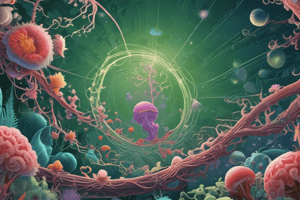Podcast
Questions and Answers
What is a unifying theme in biology that explains the unity and diversity of life?
What is a unifying theme in biology that explains the unity and diversity of life?
- Energy processing
- Evolution (correct)
- Regulation of internal environments
- Cellular composition
What is the role of genes in organisms?
What is the role of genes in organisms?
- Regulating internal environments
- Processing energy
- Transmitting hereditary information (correct)
- Encoding environmental information
What allows biologists to study life at multiple levels of organization?
What allows biologists to study life at multiple levels of organization?
- The broad scope of biology
- The diversity of life forms
- The use of scientific methods (correct)
- The unity of life forms
Which type of organisms include protists, fungi, plants, and animals?
Which type of organisms include protists, fungi, plants, and animals?
What is the primary function of energy processing in organisms?
What is the primary function of energy processing in organisms?
What is the study of tissues known as?
What is the study of tissues known as?
Who is considered as the 'Father of Histology'?
Who is considered as the 'Father of Histology'?
What are the three broad categories of plant tissues?
What are the three broad categories of plant tissues?
Which tool has enhanced the detail that can be observed in tissues?
Which tool has enhanced the detail that can be observed in tissues?
'Tissue' is derived from which word?
'Tissue' is derived from which word?
Flashcards
Unifying theme in biology
Unifying theme in biology
Evolution explains the shared characteristics and differences among living organisms.
Role of genes
Role of genes
Genes carry instructions for inherited traits.
Studying life levels
Studying life levels
Scientific methods allow investigation of life from molecules to ecosystems.
Eukaryotic organisms
Eukaryotic organisms
Organisms with membrane-bound organelles, including protists, fungi, plants, and animals.
Signup and view all the flashcards
Energy processing role
Energy processing role
To support life functions like movement and reproduction.
Signup and view all the flashcards
Histology study
Histology study
Study of tissues.
Signup and view all the flashcards
Father of Histology
Father of Histology
Xavier Bichat.
Signup and view all the flashcards
Plant tissue categories
Plant tissue categories
Epidermis, ground tissue, vascular tissue.
Signup and view all the flashcards
Electron microscopy use
Electron microscopy use
Enhanced tissue observation detail.
Signup and view all the flashcards
Origin of 'tissue'
Origin of 'tissue'
'Tissue' comes from 'tissu'.
Signup and view all the flashcardsStudy Notes
Unity and Diversity of Life
- The unifying theme in biology that explains the unity and diversity of life is evolution.
Genes and Organisms
- Genes play a crucial role in organisms as they determine the characteristics and traits of an organism.
Levels of Organization
- Biologists can study life at multiple levels of organization, including molecules, cells, tissues, organs, and ecosystems.
Classification of Organisms
- Eukarya is the domain that includes protists, fungi, plants, and animals.
Energy Processing
- The primary function of energy processing in organisms is to generate energy for cellular activities.
Study of Tissues
- Histology is the study of tissues.
History of Histology
- Marcello Malpighi is considered the 'Father of Histology'.
Plant Tissues
- The three broad categories of plant tissues are dermal, ground, and vascular tissues.
Microscopy
- The electron microscope has enhanced the detail that can be observed in tissues.
Etymology of 'Tissue'
- The word 'tissue' is derived from the Old French word 'tissu', meaning 'cloth' or 'fabric'.
Studying That Suits You
Use AI to generate personalized quizzes and flashcards to suit your learning preferences.




